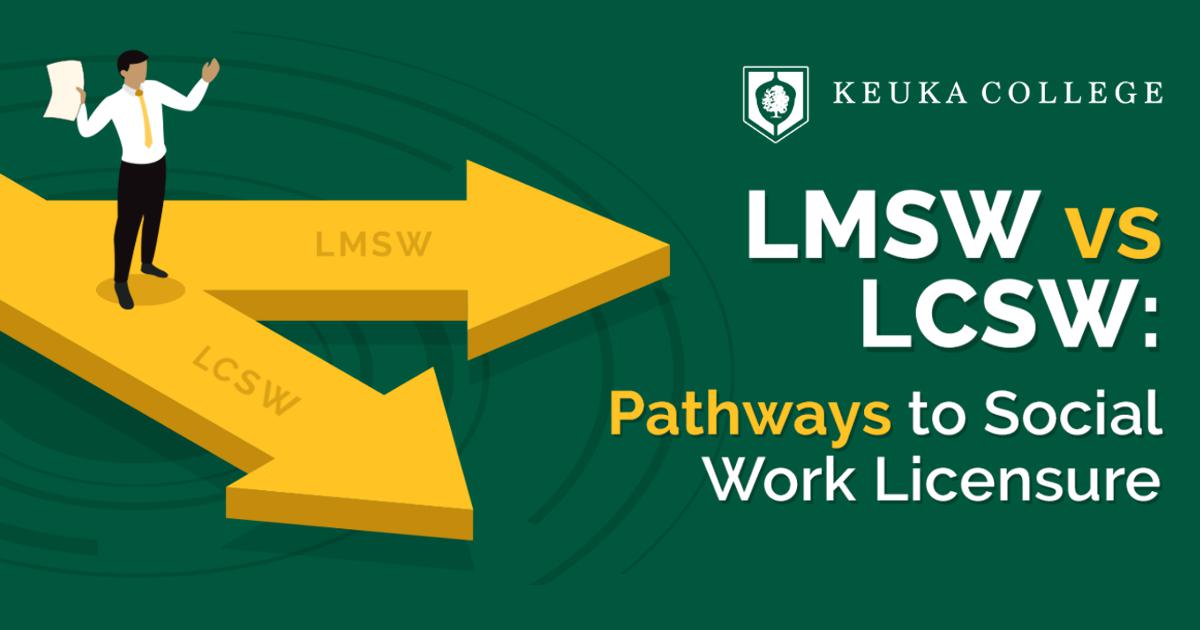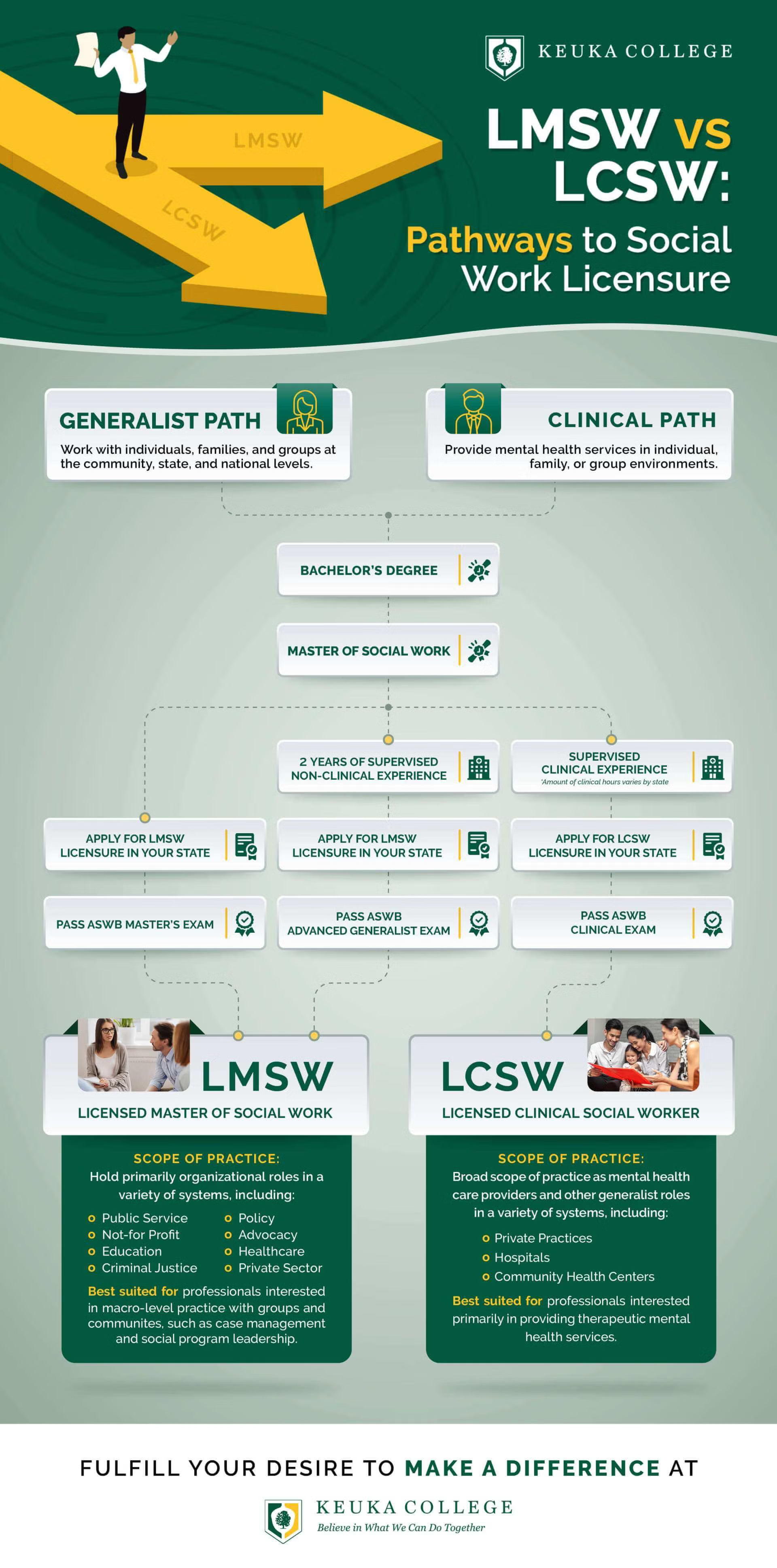LMSW vs. LCSW: Which Path is Right for Me?

Whether you're drawn to guiding people through life's challenges or interested in specializing in one-on-one mental health services, social work offers a variety of paths to licensure that align with your career goals. In this infographic, we'll explore the differences between LMSW (Licensed Master Social Worker) vs. LCSW (Licensed Clinical Social Worker) to help you decide which path is right for you.

What is an LMSW?
A Licensed Master Social Worker (LMSW) is the specific job title held by social workers who hold their MSW and meet their state's licensure requirements. This designation allows social workers to practice in a variety of settings, including schools, hospitals, and government agencies. LMSWs are often involved in case management, advocacy, and connecting clients with resources. They work under the supervision of a more experienced social worker, such as an LCSW, especially when involved in clinical settings.
Job Outlook for LMSWs
The demand for social workers in the United States is strong, particularly in community-based services and public health. According to the U.S. Bureau of Labor Statistics (BLS), employment of social workers overall is expected to grow at a rate of 7%, significantly outpacing the average for all occupations. With approximately 67,300 job openings projected each year, social work is a promising and expanding career choice.
Education and Licensing Requirements
The path to becoming a LMSW is marked by the following major milestones:
- Earn a Bachelor's Degree: Begin by obtaining a bachelor’s degree in social work (BSW) or a related field, such as psychology or sociology.
- Complete an MSW Program: Enroll in and complete a Master of Social Work program accredited by the CSWE. If attending full-time, this typically takes two years.
- Gain Field Experience: Participate in supervised fieldwork or internships during your MSW program to gain practical experience in social work settings.
- Apply for Licensure: After graduating with your MSW, apply for licensure in the state where you plan to practice. Each state has specific requirements, so be sure to check with your state’s licensing board.
- Pass the LMSW Licensing Exam: Prepare for and pass the Association of Social Work Boards (ASWB) Master’s Exam, which is required for LMSW licensure in most states. Some states may also have additional exams or requirements. Research your state’s requirements.
- Obtain Your LMSW License: Once you pass the exam and meet all state requirements, you will be granted your LMSW license, allowing you to begin practicing as a Licensed Master Social Worker.
- Maintain Your License: Stay current with continuing education requirements to maintain your LMSW license. These requirements vary by state and are necessary for license renewal.
What is an LCSW?
A Licensed Clinical Social Worker (LCSW) is an advanced licensure level that allows social workers to provide mental health services, including psychotherapy. LCSWs can assess, diagnose and treat mental, behavioral, and emotional disorders, and they often work in clinical settings such as private practices, hospitals, and mental health clinics.
Job Outlook for LCSWs
The demand for LCSWs is especially strong in the mental health field, where they play a crucial role in providing direct clinical care. As more people seek mental health services, the need for LCSWs continues to rise. The U.S. BLS projects a 12% increase in job growth for mental health social workers, with approximately 123,700 job openings expected in this field.
Education and Licensing Requirements
Becoming an LCSW requires an MSW degree, followed by additional supervised clinical experience—typically two years or 3,000 hours. After completing this experience, you'll need to pass a clinical exam to obtain your LCSW license.
Becoming a Licensed Clinical Social Worker involves several important steps:
- Earn a Bachelor's Degree: Begin by earning a bachelor’s degree in social work or a related field, such as psychology, sociology, or human services.
- Complete an MSW Program: Enroll in and complete a Master of Social Work program accredited by the CSWE. If attending full-time, this typically takes two years.
- Gain Supervised Clinical Experience: After you graduate with your MSW degree, you are eligible to take the LMSW exam and practice as a LMSW while you accrue clinical hours via supervised clinical experience. This typically involves working for two years or completing 3,000 hours of clinical practice under the supervision of a licensed clinical social worker. This experience is crucial for developing your skills in mental health services, diagnosis, and treatment.
- Apply for LCSW Candidacy: Depending on your state's requirements, you may need to apply for LCSW candidacy, which officially recognizes your progress toward full licensure for clinical practice and allows you to continue your supervised practice.
- Prepare for and Pass the Clinical Exam: This exam tests your knowledge and skills in clinical social work, including assessment, diagnosis, and treatment planning. Some states may offer additional resources or preparatory courses to help you succeed.
- Apply for Your LCSW License: After passing the clinical exam and meeting all other state requirements, apply for your LCSW license. This will allow you to practice independently as a Licensed Clinical Social Worker.
- Maintain Your License: To keep your LCSW license active, stay up-to-date with continuing education requirements. These vary by state and are essential for license renewal.
LMSW vs. LCSW: Responsibilities at a Glance
Understanding the key responsibilities of the LMSW vs. LCSW can help you decide which path aligns with your career aspirations. Here's a breakdown of the primary duties for each role:
LMSW Responsibilities
- Conducting client assessments and creating service plans
- Case management and coordinating care with other service providers
- Advocating for clients' rights and connecting them with community resources
- Supporting clients in navigating social services, such as housing or employment assistance
- Working under the supervision of an LCSW or other senior social worker in clinical settings
LCSW Responsibilities
- Diagnosing and treating mental health, behavioral, and emotional disorders
- Providing psychotherapy and counseling to individuals, families, and groups
- Developing and implementing treatment plans based on clinical assessments
- Conducting crisis intervention and offering support during emergencies
- Supervising LMSWs and other social workers in clinical settings
- Potentially opening a private practice to offer mental health services
Choosing the Right Path: Factors to Consider
When deciding between the LMSW vs. LCSW paths, consider your interests, career goals, and personal circumstances.
- Interests: If you are passionate about mental health treatment and want to provide psychotherapy, the LCSW path may align with your goals. On the other hand, if you're interested in case management, community organizing, or advocacy, an LMSW might be the right fit.
- Career Goals: Consider where you see yourself in the future. If you aspire to open a private practice or specialize in mental health services, pursuing an LCSW will provide the necessary qualifications. If you're more interested in working in non-clinical settings, an LMSW will offer you a broad range of opportunities.
The Importance of a Clinically-Focused MSW Program
No matter which path you choose, completing a clinically focused MSW program is essential for launching a successful career in social work, particularly in the fields of mental health and clinical support. Online clinical MSW programs, like the one offered by Keuka College, provide the comprehensive education and hands-on experience needed to excel in both LMSW and LCSW roles. With a focus on practical skills and real-world applications, Keuka College prepares you to meet the challenges of today’s social work environment.
Ready to Take the Next Step?
If you’re considering a career in social work and want to explore your options, Keuka College offers an online clinical MSW program designed to help you achieve your goals. Learn more about our program and how it can prepare you for a rewarding career in social work.
For more information, check out these related resources:
- The Importance of CSWE Accreditation
- Empowering Social Workers: Why Keuka College?
- 6 Reasons to Pursue a Second Career in Social Work
Start your journey to become a licensed social worker with Keuka College’s clinically-focused online MSW program.
